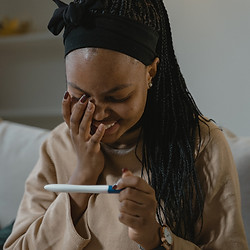
Your Pregnancy
The First Trimester
The first trimester is the earliest phase of pregnancy. It starts on the first day of your last period -- before you're even actually pregnant -- and lasts until the end of the 13th week. It's a time of great anticipation and of rapid changes for both you and your baby.
Appointments and Scans
Confirmation of pregnancy
8/12 Week Scan - determines due date
Tests
Standard urine analysis - this is checked at every prenatal appointment
1st Trimester blood screening includes blood type (Rhesus +/-) and markers for Down's Syndrome
What to expect
You can expect to experience a variety of symptoms, some not so pleasant. In early pregnancy, the embryo feeds off the yolk sac. Your body is working hard to nourish and grow your little baby and surging hormones are the culprits for your symptoms!
Normal symptoms can include:
-
Nausea/Morning Sickness
-
Sore/Tender Breasts or Nipples
-
Urge to urinate often
-
Heightened smell
-
Food aversions
-
Heartburn
-
Gas
-
Constiptation
-
Fatigue/Tiredness


The Second Trimester
The second trimester of your pregnancy lasts from week 13 to 28, or months 4, 5, and 6. It’s the middle phase of pregnancy, when you may start to see your “baby bump” and feel your baby move for the first time. Thankfully a lot of symptoms from the first trimester start to disappear and you may find yourself with some renewed energy!
Appointments and Scans
Detailed Fetal anatomy scan
Bi Monthly Antenatal Check Ups
Bed booking for delivery
Tests
Standard urine analysis - this is checked at every prenatal appointment
Second trimester antenatal blood tests, not done during the first trimester
Further testing if needed for genetic abnormalities
Glucose test
Please note that all these non-invasive modalities (history, blood tests and scans) are screening tools and may not pick up all abnormalities.
What to expect
Your second trimester is where you start to see real growth from your baby as your bump starts to expand. During 16-20 weeks you will also start to feel baby's movements. These begin with flutterings or quickenings. If this is your first pregnancy you may not feel these at first. The placenta has taken over from your body producing the hormones that baby needs to grow so you might find your symptoms from the first trimester disappearing. These will be replaced as your baby grows. You may or may not experience these.
Some second trimester symptoms can include:
-
Growing bump and breasts
-
Itchy Skin
-
Pigmentation (darkening of skin, commonly found on face and a vertical line on your belly)
-
Leg cramps
-
Nose congestion or bleeding
-
Bleeding gums
-
Increased libido
-
Swollen feet and ankles
-
Vaginal discharge
-
Bursts of energy
-
Forgetfulness


The Third Trimester
The third trimester is the last phase of your pregnancy. It lasts from weeks 29 to 40, or months 7, 8, and 9. During this trimester, your baby grows, develops, and starts to change position to get ready for birth. Now that you've reached the third trimester, you're in the home stretch of your pregnancy. You've only got a few more weeks to go, but this part of your pregnancy can be the most challenging.
Appointments and Scans
Weekly check ups up until birth
Growth Scans
Birthing Plan
4D scan (optional)
Tests
Standard urine analysis - this is checked at every prenatal appointment
What to expect
The third trimester marks the home stretch, as you prepare for the delivery of your baby. The fetus is continuing to grow in weight and size, and the body systems finish maturing. You may feel more uncomfortable now as you continue to gain weight and begin to have false labor contractions (called Braxton-Hicks contractions).
Normal third trimester symptoms can include:
-
Back ache
-
Frequent need to urinate
-
Braxton Hicks (false labour contractions)
-
Struggle with sleeping
-
Leg swelling/cramping
-
Constipation
-
Heartburn
-
Stretchmarks
-
Hemorrhoids
-
Leaking from breasts
-
Varicose Veins



